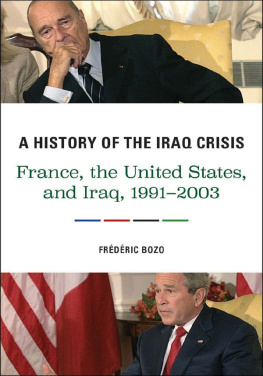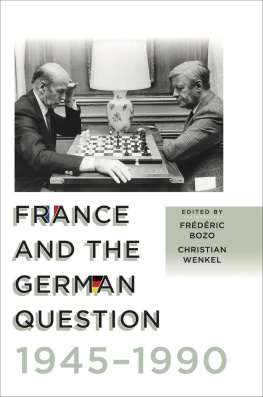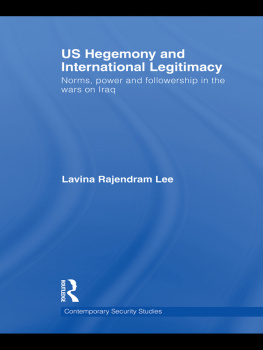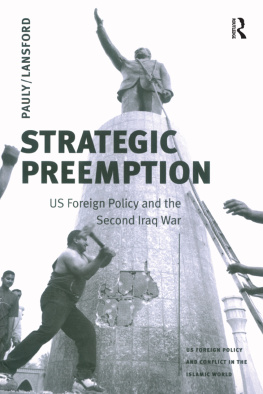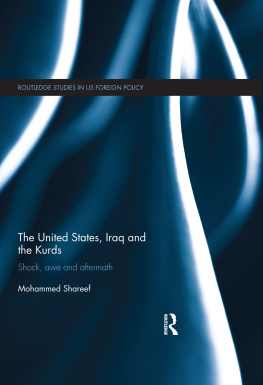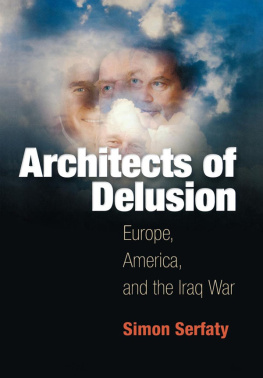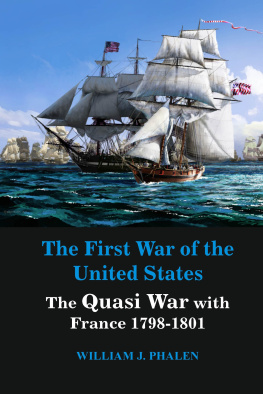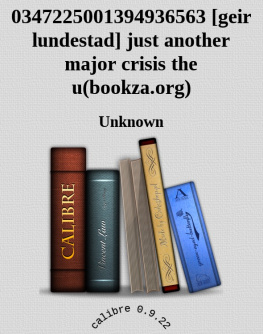Woodrow Wilson Center Press
Washington, D.C.
www.wilsoncenter.org
Columbia University Press
Publishers Since 1893
New York Chichester, West Sussex
cup.columbia.edu
Copyright 2016 Frdric Bozo
All rights reserved
EISBN 978-0-231-80139-3
Library of Congress Cataloging-in-Publication Data
Names: Bozo, Frdric, author. | Emanuel, Susan, translator.
Title: A history of the Iraq crisis : France, the United States, and Iraq, 19912003 / Frdric Bozo ; translated by Susan Emanuel.
Other titles: Histoire secrte de la crise irakienne. English
Description: Washington, D.C. : Woodrow Wilson Center Press ; New York : Columbia University Press, [2016] | Includes bibliographical references and index.
Identifiers: LCCN 2016013007 (print) | LCCN 2016015085 (ebook) | ISBN 9780231704441 (cloth : alk. paper) | ISBN 9780231801393 (ebook)
Subjects: LCSH: Persian Gulf War, 1991Diplomatic history. | Iraq War, 20032011Diplomatic history. | FranceRelationsUnited States. | United StatesRelationsFrance. | FranceMilitary relationsUnited States. | United StatesMilitary relationsFrance.
Classification: LCC DS79.75.B6913 2016 (print) | LCC DS79.75 (ebook) | DDC 956.7044/32dc23
A Columbia University Press E-book.
CUP would be pleased to hear about your reading experience with this e-book at .
LC record available at http://lccn.loc.gov/2016013007
Cover photo: US president George W. Bush meeting with French president Jacques Chirac in New York, ahead of the 61st United Nations General Assembly, September 19, 2006. AFP Photo/Jim Watson
Design and layout: Station 10 Creative
The Wilson Center, chartered by Congress as the official memorial to President Woodrow Wilson, is the nations key nonpartisan policy forum for tackling global issues through independent research and open dialogue to inform actionable ideas for Congress, the Administration, and the broader policy community.
Conclusions or opinions expressed in Center publications and programs are those of the authors and speakers and do not necessarily reflect the views of the Center staff, fellows, trustees, advisory groups, or any individuals or organizations that provide financial support to the Center.
Please visit us online at www.wilsoncenter.org.
Jane Harman, Director, President, and CEO
Board of Trustees
Thomas R. Nides, Chair
Public members: William D. Adams, Chairman of the National Endowment for the Humanities; Sylvia Mathews Burwell, Secretary of Health and Human Services; David Ferriero, Archivist of the United States; Carla D. Hayden, Librarian of Congress; John F. Kerry, Secretary of State; John B. King Jr., Secretary of Education; David J. Skorton, Secretary of the Smithsonian Institution. Designated appointee of the president from within the federal government: Fred P. Hochberg, Chairman and President, Export-Import Bank of the United States
Private Citizen members: Peter J. Beshar, John T. Casteen III, Thelma Duggin, Lt. Gen. Susan Helms, USAF (Ret.), Barry S. Jackson, Nathalie Rayes, Earl W. Stafford, Jane Watson Stetson
Wilson National Cabinet
Ambassador Joseph B. Gildenhorn & Alma Gildenhorn, Co-chairs
Peter J. Beshar, Eddie & Sylvia Brown, Armeane & Mary Choksi, Ambassador Sue & Ambassador Chuck Cobb, Lester Crown, Thelma Duggin, Judi Flom, Sander R. Gerber, Harman Family Foundation, Frank F. Islam, Willem Kooyker, Raymond Learsy & Melva Bucksbaum*, Frederic V. & Marlene A. Malek, Ambassador Robert A. & Julie Mandell, Thomas R. Nides, Nathalie Rayes, Wayne Rogers, B. Francis Saul II, Diana Davis Spencer, Earl W. Stafford, Jane Watson Stetson, Leo Zickler *deceased
My first encounter with Stanley Hoffmann more than three decades ago influenced my intellectual journey more than any other. When this book was first published in France in 2013, it seemed to me obvious to dedicate to him a study of historic events that I knew had profoundly affected him. We (or rather he, as my role was that of a modest interviewer) had discussed these events in a book that had appeared shortly after the fact in France, and later in the United States. In rereading our 2003 conversation, I am amazed by Stanleys extraordinary perceptiveness, his clairvoyance, and his moral integrity. I hoped that he would see the present book as a testimonial of my gratitude and affection, and I was pleased that he was able to read it when it appeared in France. Stanley has since passed away, creating an immense lossin particular for his former students and colleagues, many of whom, like me, had become his friends. He was a formidable intellectual and an exceptional individual.
This book owes a great deal to the many institutions and individuals who made it possible. As the happy few know, the Nobel Institute in Oslo, Norway, offers an incomparable working environment for historians and international relations specialists. By inviting me there for two months in the spring of 2007 for the second time, the institutes director, Geir Lundestad, and its academic director, Olav Njlstad, allowed me to begin to reflect on this book under the best possible conditions, for which I am very thankful.
By granting me a semesters sabbatical leave for research in 200910, my home university enabled me to devote the time necessary for the launch of my research in the archives and a first series of interviews. I am grateful to the scientific council of the university for having thus given me the possibility to advance this project more quickly.
Access to archives was a precondition, and many people under various guises helped to make this possible, among whom I want to thank Grard Araud, Anne de la Blache, Jrme Bonnafont, Monique Constant, Jay Dharmadhikari, Philippe Errera, Franck Gellet, Pascal Geneste, Emmanuelle Flament-Guelfucci, Manuel Lafont-Rapnouil, Bertrand Landrieu, Alexis Morel, and Hughes Moret.
It would not have been possible for me to bring my research to fruition without the years stay I was able to enjoy in 201011 as a public policy scholar at the Woodrow Wilson International Center for Scholars in Washington, D.C., another key place for the study of international relations. I want to thank in particular Christian Ostermann, Samuel Wells, Michael Van Dusen, and Robert S. Litwak for having invited and hosted me and for thus allowing me to benefit from an exceptionally conducive research environment. Daily conversations with my colleagues at the Wilson Center who shared with me the same focus on the Iraq issue, foremost among whom were Melvyn P. Leffler and Joseph Sassoon, were essential. My research assistants, Yannek Smith, Whitney Wallace, and Aniseh Bassiri, greatly contributed to the effectiveness of my work. Great thanks for their help are also due to those in charge at the library: Janet Spikes, Dagne Gizaw, and Michelle Kamalich.
My stay in Washington would not have offered such fine conditions without the help of two other institutions to which I would also like to express my gratitude. Frances Centre national de la recherche scientifique (CNRS) granted me a one-year secondment to its Washington bureau. I am thankful to Alain Laquize, Claudio Galderisi, Diane Brami, Jean Favero, and Bernard Bobe, who helped me in various ways. Last but not least, the Franco-American Commission for Educational Exchange granted me a Fulbright scholarship for the duration of my American stay. I thank Arnaud Roujou de Boube and Sverine Peyrichou for their support.

